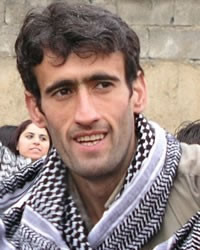Kurd, Kurmanji in Russia

Photo Source:
manothegreek
|
Send Joshua Project a map of this people group.
|
| People Name: | Kurd, Kurmanji |
| Country: | Russia |
| 10/40 Window: | No |
| Population: | 25,000 |
| World Population: | 16,544,400 |
| Primary Language: | Kurdish, Northern |
| Primary Religion: | Islam |
| Christian Adherents: | 3.00 % |
| Evangelicals: | 1.00 % |
| Scripture: | Complete Bible |
| Ministry Resources: | Yes |
| Jesus Film: | Yes |
| Audio Recordings: | Yes |
| People Cluster: | Kurd |
| Affinity Bloc: | Persian-Median |
| Progress Level: |
|
Introduction / History
The Northern or Kurmanji Kurds in Russia are actually part of a much greater Kurdish population. They are made up of a number of clans, tribes, and tribal confederations, many of which have been in existence for thousands of years. This large people group shares several important and common ties. The Kurds are the largest ethnic group in the world without their own country. Not only do the Kurds speak closely related languages, but they also share a common culture, geographical homeland and sense of identity.
The Kurds now living in southern Russia fled persecution in the Turkish Ottoman Empire in the 19th and 20th centuries. Until 1991 it was illegal to speak the Kurdish language in Turkey. A complete Bible in northern Kurdish became available in 2008. Only a tiny number of Kurds in Russia claim to be followers of Jesus.
What Are Their Lives Like?
The traditional occupations of Kurmanji Kurds in their homeland were agriculture and animal husbandry. Some Kurmanji Kurds in Russia live a rural life as their ancestors did. However, many have moved to cities to obtain a better life for their children. Kurds own restaurant and shops. They work in manufacturing, construction, retail, and tourism. In modern Russia Kurds are permitted to practice their religion and speak Kurmanji in their families. They speak Russian at work or school.
While the Kurds in Turkey and Iran are relatively poor, Kurds in Russia are among the nation's most prosperous citizens. The prosperity of the Kurds is evident in the quality of their homes. They have modern houses made of stone or brick, usually equipped with central heating. Their villages have broad, well-lit streets, linked to the cities by reasonably good roads. They have their own Kurdish weekend schools, schoolbooks, and a printing press as well as many other things that are considered luxurious in Kurdistan. They currently face little or no discrimination in Russia. Illiteracy disappeared among Kurds in the 1930s. The Kurds are noted for their elaborate and colorful national costumes that they wear on holidays. The men's attire consists of baggy, colored trousers and plain shirts with huge sleeves split at the wrist and tied at the elbow. They also wear brilliantly colored vests and sashes. Women wear brightly embroidered, heavy clothing.
The husband/father is the head of the Kurdish home. Traditionally, the Kurdish mother stayed home to take him of children and do domestic chores. This is changing as more Kurdish women become educated and take jobs outside the home.
What Are Their Beliefs?
Almost all Kurmanji Kurds living in Russia are Muslims, mostly Sunni but also many Shia. Only a tiny number claim to be followers of Jesus Christ. Muslims try to obey the teachings of the Koran and the prophet Muhammad. Muslims believe that by following the Five Pillars of Islam that they will attain heaven when they die. However, Allah, the supreme God of the universe, determines who enters paradise. Muslims pray five times a day facing Mecca. They fast the month of Ramadan. They attend mosque services on Friday. If a Muslim has the means, he or she will make a pilgrimage to Mecca once in his or her lifetime. Muslims are also prohibited from drinking alcohol, eating pork, gambling, stealing, using deceit, slandering and making idols.
The two main holidays for Sunni Muslims are Eid al Fitr, the breaking of the monthly fast and Eid al Adha, the celebration of Abraham's willingness to sacrifice his son to Allah. The most important days on the Kurdish calendar are the New Year's festival or Newroz (or Nowruz.) Kurds wear traditional clothing, eat special foods, dance, sing and jump over bonfires. Newroz starts on Mar 19 to March 21.
What Are Their Needs?
Kurds have a strong sense of family values and tradition runs deep within their communities. This is a good foundation; Christ followers need to start with this common value. However, each Kurd needs to hear a clear presentation of the gospel that will lead them to the cross. There are strong Christians in Russia who can do this.
Prayer Points
Ask the Lord to call believers to share the gospel with Kurmanji Kurds in Russia.
Ask the Holy Spirit to soften the hearts of Kurds in Russia so that they will be receptive to the gospel.
Pray that God will raise up strong fellowships of believers among the Kurds in Russia leading to an unstoppable movement to Christ.